Palestinian Central Bureau of Statistics 1 October 2004

Israeli destruction in Khan Younis, Gaza. (Ronald de Hommel)
Main Findings of the Survey on the Impact of Israeli Measures on the Economic Conditions of the Palestinian Households
226,000 Palestinian households lost more than 50% of their usual income and about 22.6% of Households in Gaza Strip Suffered from Highly Critical Living Conditions
The PCBS (Palestinian Central Bureau of Statistics) conducted the 9th round of the survey on the impact of Israeli measures on the economic conditions of the Palestinian households. Data collection was conducted during the Second Quarter 2004.
The main objective of the survey is to continue monitoring the economic conditions of the Palestinian households and their standards of living as the Israeli measures continued against the PNA and the Palestinian people. This round of the survey is based on a random sample of 3,908 households, of which 3,398 households completed the interview. The completed interviews are distributed by region as 2,228 in the West Bank and 1,170 in the Gaza Strip.
Household’s income - Results indicate that the median monthly income in the Palestinian Territory has decreased from NIS 2,500 (620 USD/706 EURO) before Al Aqsa Intifada to NIS 1,600 (355 USD/289 EURO) during the 2nd Quarter 2004. This decrease varies by region. The median monthly income decreased in the West Bank from NIS 3,000 (744 USD/847 EURO) to NIS 2,000 (444 USD/361 EURO) while in the Gaza Strip it decreased from NIS 1,500 (372 USD/423 EURO) to NIS 1,200 (266 USD/216 EURO).
Results of the survey indicate that 59.7% (362,000 households) of the Palestinian households decreased their income during Al-Aqsa Intifada, of which 62.5% (226,000 households) lost more than 50% of their usual income during Al-Aqsa Intifada, while 63.3% (159,000 households) of the households decreased their income in the West Bank compared with 52.3% (67,000 households) in Gaza Strip.
The Income Sources - Results of the survey indicate that the main income source of the Palestinian households during 2nd Quarter 2004 was wages and salaries from the private sector, (30.7%), followed by wages and salaries from public sector employment (19.9%) and from households projects (14.2%).
Coping Strategies - The results indicated that during year 2003, 58.2% of the households (353,000 households) in the Palestinian Territory reduced there expenditure on basic needs, 59.5% in the West Bank and 55.4% in Gaza Strip.
The results indicate also that 78.0% of the households took various coping measures during year 2003 depending on the monthly family income. This was manifested in delaying payment of bills by 69.4% and reduced expenditure by 58.7%.
The survey indicates that 31.2% of the households in the West Bank can cope with the situation for more than one year, comparing with 26.8% in Gaza Strip. 22.6% of the households in Gaza Strip, and 11.7% in the West Bank suffered from highly critical living conditions.
Humanitarian aid - Results show that 21.2% of interviewed households (128,000 households) reported that they received humanitarian assistance during the 2nd Quarter 2004, of which 18.2% in the West Bank and 27.2% in Gaza Strip.
On the other hand, 71.8% of the households (435,000 households) reported that they need assistance, of which 71.7% in the West Bank and 71.9% in Gaza Strip. About 13.1% of the households receiving humanitarian aid reported that the total amount of assistance received is less than NIS 100, while 39.5% of them have received less than NIS 200, 58.2% have received less than NIS 300. However, the frequency of providing the assistance for households, PNA institutions (including Ministry of Social Affairs) are rated at the highest rank at 28.8%, then comes UNRWA by 25.6%, while relatives by 14.3%, and labor unions by 10.0%. The results reveal also that 52.8% of the total assistance is provided in the form of food supplies, and 28.6% in cash.
Priority Needs of Households - The results reveal that 38.4% of households reported the need for food as top priority during 2nd Quarter 2004, while 19.9 of households reported the need for work, and 18.9% of households expressed the need for money, and 9.0% of households expressed the need for education as their first priority, and 6.4% of households expressed the need for medicine as their first priority.
Access to Health Services - The results indicate that 45.3% of the households have access problem to health services because of the high cost of medical treatment, 40.1% due to the Israeli closure, 38.3% of households because of military checkpoint, and 8.9% of households because of the expansion and annexation wall.
As a social/pastoral organization of the Catholic Church working in the Holy Land since 1967, Caritas Jerusalem wishes to reiterate the need for immediate humanitarian interventions in the Palestinian territories. These should include job creation programs, micro-lending, short and long term medical assistance, humanitarian social assistance, assistance to secure needed medicines and tuition assistance.